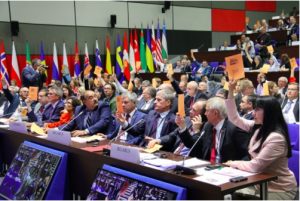DISARMAMENT & SECURITY .
Information from the press release of the OSCE Parliamentary Assembly
The OSCE Parliamentary Assembly adopted the 2017 Minsk Declaration today [July 9] with recommendations to national governments, parliaments and the international community to help shape policies in the fields of political affairs, security, economics, environment, and human rights. More than 260 parliamentarians from 55 OSCE countries and several Partners for Co-operation participated in the five-day Annual Session in Minsk held under the theme “Enhancing mutual trust and co-operation for peace and prosperity in the OSCE region.”

Belarusian delegation voting on the OSCE PA Minsk Declaration in plenary session, 9 July 2017
Parliamentarians representing the collective voice of one billion people from across the OSCE area adopted the Minsk Declaration with recommendations and pronouncements on issues including counter-terrorism, conflict resolution, climate change, migration, and strengthening the OSCE’s human rights enforcement mechanisms. (Full text available in English, French and Russian.)
[Editor’s note: Of particular importance for readers of CPNN, the Minsk Declaration included two paragraphs concerning negotiations for a ban on nuclear weapons – see below]
The Declaration “urges participating States to recommit to multilateral diplomacy in the pursuit of comprehensive security and to implement OSCE confidence-building measures” to reduce the risk of conflict. It calls for governments to “develop measures aimed at blocking the funding of terrorist organizations … including by improving legal frameworks and law enforcement methods, strengthening the security of international transportation, and by tracking the movements of terrorists within countries and across borders.”
In the economic and environmental dimension, the Declaration “urges all OSCE participating States to recognize the urgency of the climate crisis and its related challenges” and underlines that “domestic economic policies should prioritize clean energy projects, investment and innovation to promote sustained growth and ensure that negative effects on the environment are minimized.” It further calls on all OSCE countries “to ratify the 2015 Paris Agreement on climate change [and] to fulfill their obligations under the agreement.”
(Continued in right column)
Can we abolish all nuclear weapons?
(Continued from left column)
In the economic and environmental dimension, the Declaration “urges all OSCE participating States to recognize the urgency of the climate crisis and its related challenges” and underlines that “domestic economic policies should prioritize clean energy projects, investment and innovation to promote sustained growth and ensure that negative effects on the environment are minimized.” It further calls on all OSCE countries “to ratify the 2015 Paris Agreement on climate change [and] to fulfill their obligations under the agreement.”
On human rights, the Declaration “calls on OSCE participating States to respect the human dignity and equal rights of all their citizens by implementing to the fullest extent all OSCE commitments concerning human rights, fundamental freedoms, pluralistic democracy, and the rule of law.” It urges an immediate end to “the harassment, imprisonment, mistreatment, and disappearance of political opponents, human rights defenders, journalists, and other members of civil society.”
The Assembly also adopted resolutions on the crisis in and around Ukraine, the death penalty, new voting technologies, energy and water security, religious discrimination, legislative responses to new psychoactive substances, preventing child sexual exploitation, and promoting gender-inclusive conflict mediation.
The Declaration and resolutions will now be shared with parliaments and foreign ministers of OSCE countries, to serve as policy input ahead of the OSCE’s 2017 Ministerial Council meeting this year in Vienna.
[Editor’s note: Here are the two paragraphs from the Minsk Declaration concerning a ban on nuclear weapons. It should be noted that despite this advice of their parliamentarians, most of the member states of these delegations boycotted the UN negotiations,:
20. Welcoming the launch of negotiations at UN headquarters in New York between 123 countries this spring to establish an international ban against the possession, use, threat of use, acquisition, stockpiling, or deployment of nuclear weapons;
( . . . )
48. Calls on all countries to participate in UN negotiations on nuclear disarmament and to pursue the adoption of nuclear risk reduction, transparency and disarmament measures; ]